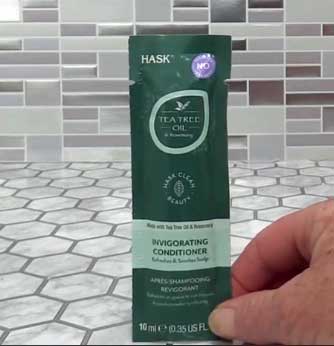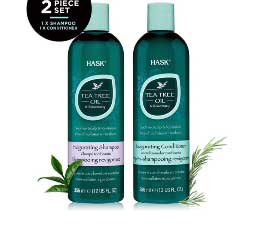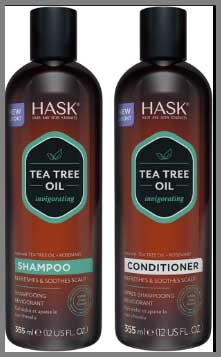If you are struggling with an oily, itchy scalp that just won’t quit, or if you feel like your hair is constantly weighed down by product buildup, I’m telling you right now: stop what you’re doing. You need to go out and buy the HASK Tea Tree Oil & Rosemary Invigorating Shampoo.
I was skeptical that a drugstore, sulfate-free shampoo could really tackle my scalp issues without stripping my hair, but this bottle delivered an experience—and results—that I had to share. It has completely changed my wash-day routine for the better.
My Experience With Hask Tea Tree Shampoo

My journey to this shampoo was one of desperation.
My scalp is a unique brand of difficult: it’s oily by the end of day one, prone to itchiness, and I’m a heavy user of dry shampoo and texturizing sprays.
This combination leaves me with a scalp that feels clogged and hair that looks lifeless, even when it’s “clean.”
I’ve tried expensive salon brands that promised the world and delivered very little, and I’ve tried harsh drugstore shampoos that left my scalp clean but my hair feeling like absolute straw.
I needed something that could deeply cleanse my scalp without being a detergent-level disaster for my ends.
I grabbed the HASK Tea Tree Oil & Rosemary shampoo and conditioner on a whim at the supermarket, mostly because the green bottle looked refreshing and the “sulfate-free” label made me feel less guilty. The first thing I noticed when I used it was the smell. It’s not a sweet, floral scent; it’s a sharp, herbal, almost medicinal blast of tea tree and mint. It smells exactly like Irish Spring soap, which, for me, was an incredibly clean and nostalgic scent.
The second I started massaging it into my scalp, the tingle began. It’s not a burn, as I’ve felt with other tea tree products, but a genuine, cooling, “ahhh” sensation. It felt like my scalp was finally breathing. The shampoo lathers up beautifully, which I honestly wasn’t expecting from a sulfate-free formula. I really focused on scrubbing my roots and scalp, letting the suds just rinse down the lengths of my hair.
After rinsing, my hair felt… clean. Squeaky clean. So clean, in fact, that I was a little worried. It felt very cleansed, and I knew I would definitely need the matching conditioner, which, thankfully, is very moisturizing and balanced things out. Once my hair was dry, the difference was immediate. My roots had actual lift. My hair felt lighter, bouncier, and my scalp felt calm for the first time in weeks. The itchiness was just gone. I found I could comfortably go two, even three, days before needing to wash again. This shampoo didn’t just clean my hair; it felt like it reset my entire scalp.
Read more: My Thoughts on Palmer’s Skin Success Eventone Fade Cream
Pros Of Hask Tea Tree Shampoo
- That Incredible Tingle: The primary reason you buy a tea tree shampoo is for the sensation, and HASK delivers. It’s a cooling, invigorating tingle that doesn’t feel like a chemical burn. It’s the perfect wake-up-call in a morning shower and feels immensely soothing on an itchy, irritated scalp. It genuinely feels like it’s working to calm things down.
- Affordability Factor: This is a huge pro. I’ve spent $30-$40 on salon-brand tea tree shampoos that gave me the exact same, or sometimes worse, results. HASK gives you that premium, high-performance feel at a drugstore price. You don’t feel guilty about using a generous amount, and it’s accessible to everyone.
- Sulfate-Free Cleansing: It’s still shocking to me how well this lathers without sulfates (like Sodium Lauryl Sulfate). Sulfates are what create that big, bubbly lather, but they are also what strip your hair color and natural oils, leading to that “straw” feeling. HASK manages to create a rich, satisfying foam that breaks down oil and product buildup without stripping my color or drying out my hair’s lengths.
- Amazing Scent (If You Like Clean): I’m putting this as a pro because I love it. The scent is sharp, herbal, and invigorating. It smells like rosemary and tea tree, very green and almost medicinal. It doesn’t linger heavily on the hair after it’s dry, but it makes the shower experience feel like a spa treatment. If you hate floral or sweet scents, this is for you.
- Immediate Scalp Relief: This isn’t a marketing gimmick. I felt immediate relief from itching. If you suffer from dandruff, seborrheic dermatitis, or just general scalp irritation from product and sweat, this shampoo provides an “off” switch for that annoying, persistent itch. It just calms everything down.
- Actually Good For Oily Hair: Many shampoos claim to be for oily hair, but they are often just clarifying shampoos that are too harsh for frequent use. Because HASK is sulfate-free, I find I can use it 2-3 times a week without issue. It cleans away the grease and buildup from dry shampoo, allowing my hair to have natural volume at the root again.
- Color-Safe Confidence: As someone who colors their hair, using a clarifying-style shampoo is always a gamble. I’ve had other shampoos visibly fade my color in a single wash. I’ve used this HASK shampoo consistently and have noticed zero fading or stripping of my toner. That’s a massive win.
Cons Of Hask Tea Tree Shampoo

The Scent Can Be Polarizing
- It’s Not For Everyone: I mentioned that I love the “Irish Spring” smell, but I can see why many people wouldn’t. It is very strong and herbal. If you prefer fruity, floral, or warm vanilla-type scents, you will likely hate this. It smells clean, but in a very green, pungent way.
Potential For Dryness
- You Must Use A Conditioner: This shampoo is designed to cleanse. It does its job very, very well. Because of that, it can leave the lengths of your hair feeling a bit stripped and tangled if you don’t follow up with a good conditioner. I would not recommend using this shampoo on its own, ever. It’s a two-step system, period.
- Not For The Already-Dry: If your primary complaint is dry, brittle hair and your scalp is perfectly fine, this is not the shampoo for you. It will likely be too cleansing and could exacerbate your dryness. This is specifically for people with scalp issues or oil.
The Tingle Might Be Too Much
- Risk Of Irritation: That “invigorating tingle” I love? On the wrong person, it can be a “stinging burn.” I have seen a few reviews from people with very sensitive skin who found this shampoo irritating. The tea tree oil itself is potent, and if your scalp is compromised or you have open sores from scratching, this could be painful.
Maintenance Tips For Hask Tea Tree Shampoo
How To Maximize The Benefits
- Always Patch Test First: This is my number one tip for any product with active ingredients like tea tree oil. Before you douse your head in it, put a small amount behind your ear or on your inner arm. Wait a few minutes. If you feel a “burn” instead of a “cool,” rinse it off immediately. This will save you from a very unpleasant shower experience.
- Focus On The Scalp, Not The Ends: This is how you should shampoo in general, but it’s critical with a clarifying shampoo. Squeeze the product into your hands, lather it up, and then apply it only to your scalp. Use the pads of your fingers (not your nails!) to massage it in for a full 60 seconds. Let the product sit for a minute to really let that tea tree oil work its magic. When you rinse, the suds that run down the lengths of your hair are all you need to cleanse them. Never pile your hair on top of your head and scrub the ends.
- Don’t Be Afraid To Double-Wash: If you’re like me and you’re on day 3 or 4 with a lot of dry shampoo, the first wash might not lather well. That’s normal; it’s busy breaking down all that product. Rinse it out, and then go in with a second, smaller amount of shampoo. This second wash will lather up beautifully and give you that deep, satisfying clean.
- Always Use A Good Conditioner: I cannot stress this enough. This shampoo is step one. Step two is a high-quality, moisturizing conditioner. You need to replenish the moisture on the mids and ends of your hair that the shampoo (and your tap water) may have removed. I recommend the matching HASK Tea Tree Oil & Rosemary conditioner, as it’s designed to be moisturizing without weighing the hair down, but any good hydrating conditioner will do.
- Manage Your Frequency: Just because you can use it daily doesn’t mean you should. I find the sweet spot for me is about 2-3 times per week, or whenever my scalp feels itchy or greasy. On the “off” days, I might use a gentle moisturizing shampoo or just co-wash. Listen to your hair. If it starts to feel dry, scale back your use to once a week as a “reset” wash.
Comparison With Other Brands

Hask Vs. Paul Mitchell Tea Tree Special Shampoo
- The Price Point: This is the most obvious difference. Paul Mitchell is a premium, salon-grade brand, and its price reflects that. You will pay significantly more for the Paul Mitchell bottle. HASK provides a very similar experience for a fraction of the cost.
- The Tingle Factor: Both are famous for the “tingle.” I find the Paul Mitchell tingle to be slightly more intense and minty, while the HASK tingle is a bit more herbal and soothing. Both are very effective at waking up the scalp.
- The Ingredient Deck: The classic Paul Mitchell formula contains sulfates. This is why it’s such an effective clarifying shampoo, but it’s also why it can be very stripping and fade color. HASK’s sulfate-free formula is a major advantage, making it gentler and safer for color-treated hair.
- The “Shedding” Concern: This is purely anecdotal, but if you browse online forums, you will find a worrying number of user reports associating the Paul Mitchell Tea Tree shampoo with increased hair shedding or hair loss. I have not seen similar widespread complaints about the HASK formula. For me, this makes HASK the much safer bet.
Hask Vs. OGX Refreshing Scalp + Teatree Mint Shampoo
- The Formula Philosophy: HASK and OGX are more direct competitors in the drugstore aisle. Both are affordable and focus on the tea tree experience. However, HASK heavily markets its “Free Of” list (sulfates, parabens, phthalates, etc.). While OGX has sulfate-free options, its popular Teatree Mint line does contain sulfates.
- The Scent Profile: The OGX version has a much stronger, sweeter mint scent, almost like a peppermint patty. The HASK version, with its added rosemary, smells much more herbal and “green.” It’s a matter of personal preference.
- Cleansing Power: Because the OGX formula often contains sulfates, some users may find it feels “cleaner” or “stronger” on the first pass. However, it also carries the same risk as the Paul Mitchell—it can be too stripping for frequent use. HASK provides a gentler, more balanced cleanse that is better suited for using multiple times a week.
Also read: My Thoughts on Redness Defense Green Primer
Frequently Asked Questions (FAQ)
This really depends on your budget and your hair’s needs. If you want the original, salon-classic tingle and aren’t concerned about sulfates, many people still swear by Paul Mitchell Tea Tree Special Shampoo. If you are at the drugstore and want a great value, sulfate-free option that is gentle yet effective, I personally believe HASK Tea Tree Oil & Rosemary Shampoo is the best choice. For those who want a very high-end, “clean beauty” option, brands like Ursa Major or Sienna Naturals offer fantastic, albeit pricey, formulas.
Yes, it is excellent for certain hair types. It is specifically formulated to be good for people with oily scalps, product buildup, itchiness, or dandruff. Its invigorating, sulfate-free formula cleanses the scalp and removes impurities without the harsh stripping agents found in other clarifying shampoos. If you have very dry, brittle hair and a healthy scalp, this shampoo is probably not the right choice for you.
Yes, absolutely. It is a clarifying shampoo, but I would classify it as a gentle, sulfate-free clarifier. Its main purpose is to “invigorate” and “lift buildup and impurities,” which is the exact job of a clarifying shampoo. Unlike old-school clarifying shampoos that were like “detergent,” this one is safe enough for regular use (for most people) and on color-treated hair.
Yes, tea tree shampoo is generally very safe and beneficial for hair, and more specifically, for the scalp. Tea tree oil is a natural antiseptic and has anti-inflammatory properties, which is why it’s so effective at combating the yeast and bacteria that can cause dandruff and itchiness. It helps to unclog hair follicles and nourish the roots. The only major caveat is that a small number of people are sensitive to tea tree oil, so it can be irritating if you have a specific allergy or extremely sensitive skin.
Conclusion
So, is the HASK Tea Tree Oil & Rosemary Shampoo worth it? My answer is a resounding yes. If you are on the hunt for a shampoo that will finally solve your oily, itchy scalp problems without destroying your hair or your bank account, this is the one you should buy. It’s an affordable, effective, and sensorially pleasant experience that has earned a permanent spot in my shower. For the price of a few coffees, you can get a scalp reset that feels truly high-end.
